Greece hosts the XI Charter Network Meeting! “Exploring a Sustainable (tourism) Response”
Every two years, the EUROPARC network of Sustainable Destinations applying the European Charter for Sustainable Tourism in Protected Areas methodology comes together to exchange experience and best practice. With visitor pressure increasing in many European Protected Areas, we need to look at tourism with a different mindset. The XI Charter Network Meeting takes place in Greece between the 9-11th April, with a special post-conference excursion until the 14th April!
The social and cultural impacts of tourism: exploring a sustainable response!
Sustainable Tourism can deliver positive impacts for society. It has the potential to promote social development through employment creation, economic activities and can be a force for peace and understanding. It can also strengthen communities, as facilities and infrastructure developed for tourism can benefit locals as a reaffirmation of culture, tradition and values.
However, these same socio-cultural impacts do change local people ’s everyday experiences, the traditional way of life and intellectual and artistic products. There are concerns over culture commodification, lack of authenticity of traditions, dilution of culture and even standardisation of tourism offers. All this too affects changes in the landscape and nature of the destination.
The European Charter for Sustainable Tourism in Protected Areas, through it partnership approach, seeks to deliver social, economic and environmental benefits to an area, in a way that does not denigrate the existing culture, yet allow too for growth and development. It is a challenge to balance these competing demands.
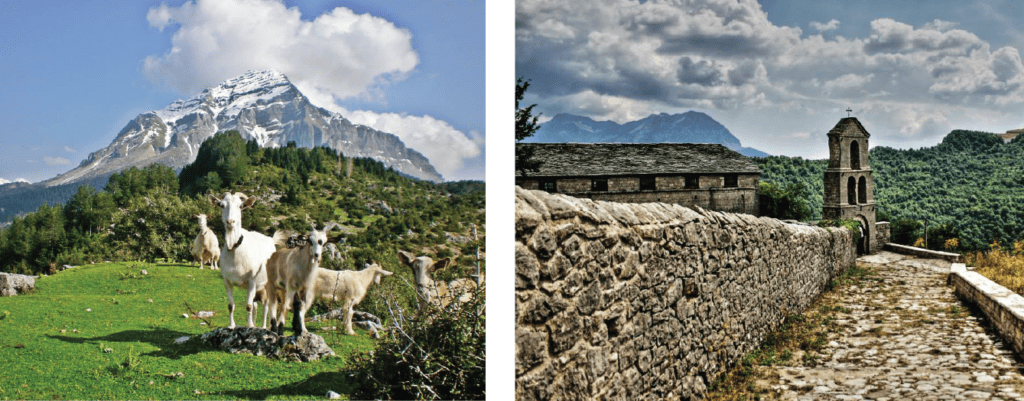
(Tzoumerka National Park) Tourism has the potential to promote social development through employment creation, income redistribution and poverty alleviation.
Agenda
Download the Agenda of_the Charter Network Meeting 2019
Keynote speakers
– Sofia Pachini, Policy Officer, Nature Protection Unit, DG Environment, European Commission – “NATURA 2000: opportunities for sustainable tourism embracing natural and cultural heritage in nature protected areas”
– Emanuele Raso, Municipality of Monterosso, 5 Terre National Park, Italy – “Managing culture and social impacts: the 5 Terre Experience”
– Prof. Dimitris Goussios, University of Thessaly, Laboratory of Rural Space
– Casa de Ecoturismo Quei Victorino – “Ecotourism as a driving force for rural areas: Experiences of a young entrepreneur”
– Carol Ritchie, Executive Director, EUROPARC Federation
Workshops
In the application form, you will be asked to choose one workshop. The workshop sessions will run on the 9th April afternoon (between 15:00 and 18:00) and on the 10th April morning (between 9:00 and 11:30). A further description of each workshop is available in the Agenda.
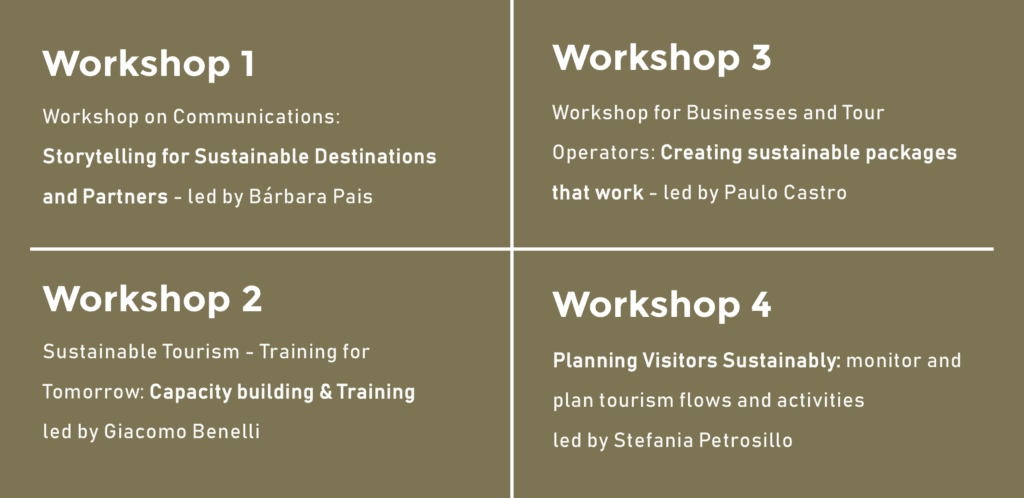
Field trips
Our host in Tzoumerka organised 6 wonderful field trips. On the 11th, we will spend the day outdoors, each participant should choose the field trip he would like to join.
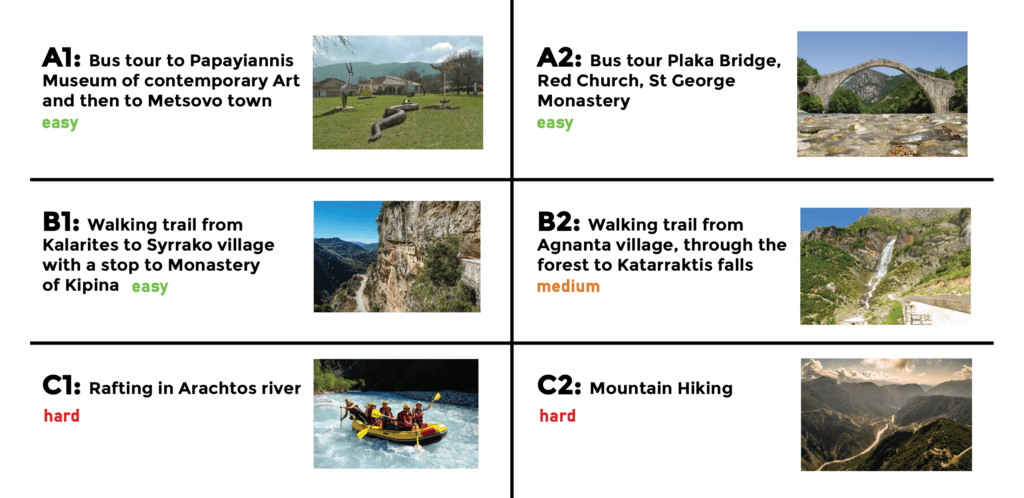
Open activities (where we need you!): marketplace and open mic session
There will be plenty of opportunities to network and share experience, learn from each other and get new ideas to take back to your own areas. For the Marketplace, you are invited to bring information, promotional material, but also the best delicacies from your country or region… Yours + mine = our Food, Enjoy and share experience ! you can either bring the material with you, or post it in advance to the Park.
There will also be an “open mic “ session. Where you can bring a 5 minute presentation of your project, ideas for projects, looking for partners or just general sustainable tourism question you want advise or input from the audience… We give you the Microphone… the floor is your (for 5 minutes).

Location and Accommodation
The meeting will bring together park and partners from across Europe to the wonderful Tzoumerka, AcheloosValley, Agrafa and Meteora National Park, in Greece. One of our newer sustainable destinations awarded with the Charter.
The meeting will take place in the Pramanta Council Hall, Pramanta town, municipality of North Tzoumerka, Region of Epirus. The National Park will kindly provide transfers on the 8th April from:
- Thessaloniki Airport
- Athens Airport
- For those arriving by ferry from Italy, a transfer will be arranged from Igoumenitsa Port
Transfers will also be ensured for the return on 12th am (and on 14th am for those joining the post conference excursion).
Our host have secured excellent value in the following hotels, so please book direct with the hotel of your choice.
All hotels are within 20 min drive and shuttle buses will bring you to the conference venue each day. Make sure you book your trip and accommodation soon, we will need to know your travel details by the end of February to organise the transfers.
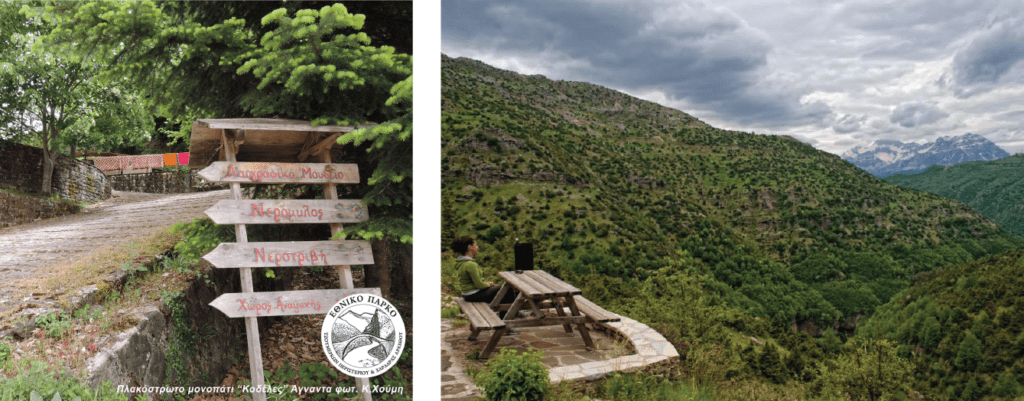
Registrations
We are open now for PRE-REGISTRATION. Please register NOW to secure your place.
- The participation fee for EUROPARC members is only 70€, and 90€ for non – members.
A second registration form will be sent for you to select your workshop and field trip so don’t worry about that for now. But do register now to ensure your secure this great bargain! And so you can make your advance travel plans.
>>>>Register here<<<<
Special 2-day Post Conference tour!
This edition, Tzoumerka National Park is offering a special 2-day post-conference between the 12-14th April for those who would like to have the chance to visit Meteora! This will be an additional cost but it highly recommended!
Download the Programme of the Post Conference Tour
We look forward to seeing you in Greece!
Natura 2000 Management inside protected areas – the case of Collserola Nature Park
Today we want to tackle a common challenge for many protected areas in Europe: the management of Natura 2000 sites located within their boundaries.
Natura 2000 network was built, during the last 25 years, over the foundations of the Habitats and Birds directives and it is designed to strictly protect threatened species and natural habitats present in the over 27.000 designated sites across the EU. As the protection of endangered species and outstanding habitats at European level has often the same relevance at regional and local level, Natura 2000 sites are frequently located within the perimeters of national or regional protected area, sometimes resulting on a full overlap*.
While the overall scope of Natura 2000 and the site conservation measures are primarily set to address very specific elements, protected area’s missions are targeting more varied matters such as the social and economic development of the territory, land use, natural resources and economic and leisure activities management, without leaving aside the protection of species and habitats, either included or excluded in the Nature Directives.
This might often lead to a complex management of different conservation priorities for the same site and a lack of integration of Natura 2000 objectives within the protected area’s management plans.
In this video interview, Francesc Llimona, biologist at Collserola Nature Park in Barcelona, describes the current integration of Natura 2000 objectives in the management plan of the park, the solutions found and the challenges the park is currently facing in this sense.
Together with this video interview, we are pleased to present you the newly developed section on Natura 2000 at EUROPARC Federation website. In it you will find up-to-date information on different resources, case studies, events and much more on the Natura 2000 scheme in Europe. We hope this can become, also thanks to your support and further case studies, a useful reference, helping managers to strengthen the integration of Natura 2000 priorities within the wider Protected Areas management plans.
* For more information on the overlap between Protected Areas and Natura 2000 sites, have a look on the report “An inquiry on the relationship between EUROPARC members and NATURA 2000 sites”. Download the Full Report or its Executive Summary.
A new National Park is born in Estonia – Alutaguse!
Lake Valgejärv in Estonia; photo by Jaana Oras from www.visitestonia.com
By the end of 2018, the Estonian Government announced the creation of a new National Park! Take a moment to get to know Alutaguse National Park, the 6th National Park of Estonia! Find out some of its history and unique species that live in this natural treasure. Congratulations Estonia!
Alutaguse National Park
The Alutaguse National Park covers predominating part of the Alutaguse lowland. One of the most characteristic features of this region is a sparse settlement and hia gh percentage of natural landscapes. The core of the national park are vast bog areas (54%) and forested landscapes (42 %).Also, Alutaguse is a border area in several meanings. During many centuries, Estonian, Russian and Votic cultures, languages and religions have mingled there.
Alutaguse National Park was established to protect a massive bog, forest and coastal landscapes together with cultural heritage, characteristic to Eastern Estonia. The largest bog massive in Estonia is the Puhatu bog.
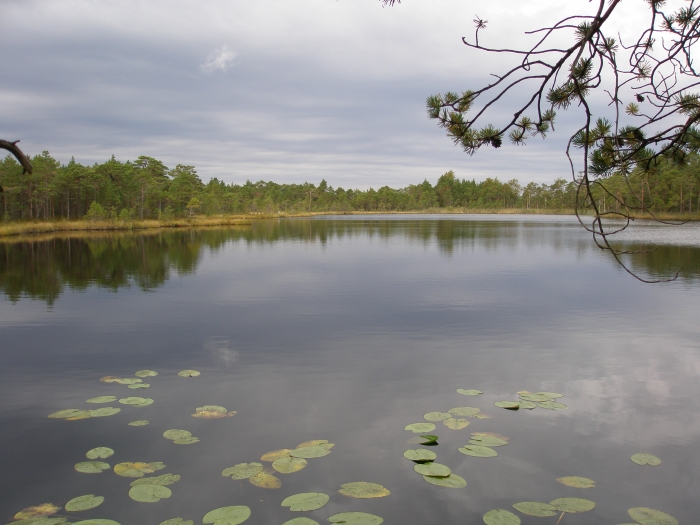
Lake Viinamardi, Puhatu bog system, Photo by Jürgen Öövel from https://www.kaitsealad.ee
Unique species of Alutaguse
Natural landscapes of the Alutaguse National Park are suitable habitats for many rare species. Here are habitats of the Flying Squirrel, the Willow Grouse and the Black Stork.
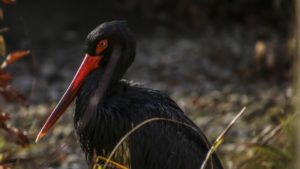
Black Stork (from pixabay)
In the region, you can spot five different eagle species, as well as the Great Grey Owl and the Peregrine.
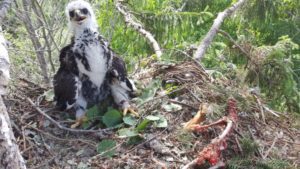
Eagle chich from www.envir.ee
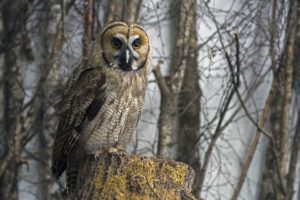
pixabay
Alutaguse is the migration route of several mammals running between Estonia and Russia. Those are the Eurasian Wolf, the Brown Bear and the European Lynx.
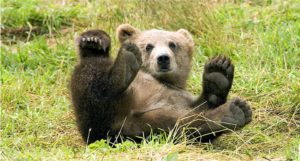
pixabay
Alutaguse National Park was established in 2018 on the basis of 11 separate protected areas.
Countless lakes and singing sands
The longest coastal sands and dune system in Estonia (40 km) is situated on the northern shore of Lake Peipsi. In this coast, the grains of sand make a sound when rubbed against each other (say, while walking), thus called „singing sands”.
Alutaguse National Park belongs to Natura 2000 – the EU network of protected areas.
Kurtna kame field – the landscape with Estonia’s highest density of lakes – is comprising almost 40 lakes. There are especially valuable lakes with very rare species among them, for instance Lake Valgejärv.
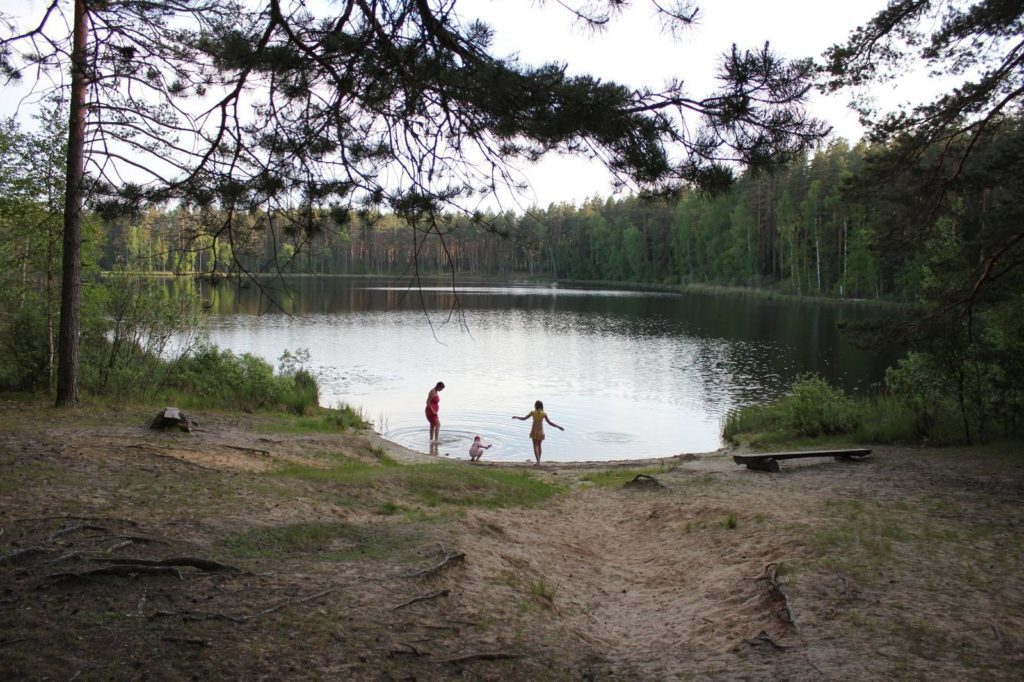
Lake Valgejärv in Estonia; photo by Jaana Oras from www.visitestonia.com
What to visit in Alataguse?
- Permanent exhibition about the local nature and sustainable life-style, in the Iisaku nature centre.
- Permanent exhibition about the nature of the county and forest management, in the Kauksi visitors centre.
- In the Iisaku Parish Museum you can learn about local history, nature and cultural heritage.
For more information feel free to visit their page
Before you go, you should know:
1) You can pass through and stay on private land from sunrise to sunset without cousing disturbance to the owner or damage to the property.
2) You need owner’s permission for moving on fenced or marked private land.
3) You can move on internal water-bodies (except bog lakes and the Lake Kõnnu) but only with a non-propelled floating craft.
4) You can drive your motor vehicle on officially available roads and pathways. Parking is allowed in parking lots.
5) Tenting and making fire is allowed only in prepared and designated locations.
6) Do not use growing trees or bushes for fire!
7) Making fire in fire-risk periods is prohibited even in special camp-fire locations.
8) All pets taken to the nature are threatening wildlife, therefore keep them leashed at all times.
9) You can gather wild berries, mushrooms and flowers that are not under protection.
10) If there is damage in the nature or visiting objects, call 1313 (Environmental Information)
Get to know all Protected Areas in Estonia
12 events for Protected Area professionals in 2019 (that you cannot miss!)
The year of change, learning and coming together
Although 2019 is only just starting, it is already full of interesting workshops and networking events that will cover many burning topics and push you to change your mindset as well as broaden your horizons.
Whether you are interested in all the ways technology can help in conservation monitoring; communication, sustainable tourism, environmental laws, or working with the youth, there is something for everyone, and you won’t be disappointed. So get your calendar ready and start writing in the dates!
5 Training courses and workshops
Siggen seminar
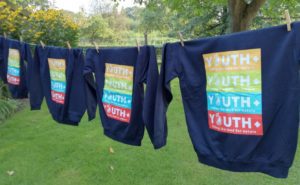
Youth+ Jumpers just hanging around – a rare moment. Photo by Laura Peters
- March 18th – 21st
- By: EUROPARC Federation
- Register here
This year’s two-day seminar will focus on working with youth. It will explore the new programme created by EUROPARC the Youth + programme and how this can be a model for working with 18-25year olds, in your park.
You will also hear from other youth programmes to gain new perspectives and ideas that will help you build a programme in your area. You will be welcome to bring your own ideas for a collective “surgery” where everyone will come up with solutions for any potential problems and challenges you may have.
The seminar is FREE to EUROPARC members (includes meals and accommodation), you will only need to cover your travel costs to Siggen.
Course of communication in protected natural areas
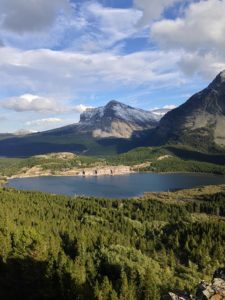
pixabay
- Registration period until February 8th
- By: FUNGOBE – Fundacion Interuniversitaria Fernando Gonzáles Bernáldez para los espacios naturales
- More information here
The course addresses the elements that are considered key to raise awareness and communication initiatives and actions in protected areas, with special emphasis on how this type of tool can contribute to the management of these places and how they can help the manager in his relationship with society as a whole. The general objective of the course is to advance in the theoretical and practical knowledge about the best ways to propose and develop initiatives and communication actions in the field of protected areas.
If you would like to apply, you have a bit more time, but keep in mind that Spanish will be required.
4th Natura 2000 Monitoring workshop
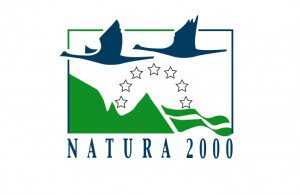
Natura 2000 Logo
- April 9th-11th
- By: Eurosite
- More information here
Save the date for the 4th Natura 2000 Monitoring workshop! Since 2013, Eurosite has organised a series of workshops to facilitate information exchange on issues related to monitoring Natura 2000 habitats and species. From April 9th to 11th the workshop ‘New technologies for Natura 2000 monitoring’ will take place in Doñana, Spain. It will be hosted by Estación Biológica de Doñana.
The sessions will focus on three main subject areas:
- the roles of satellite images in conservation monitoring
- the roles of drone images in conservation monitoring
- open source software packages that can increase the efficiency, accuracy and precision of our work
The summer school “European Parks Academy”
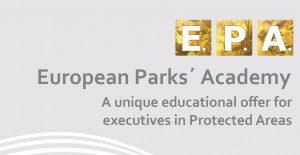
European Parks Academy
- July 15th – 20th (early bird until March 30th)
- By: E.C.O. Institute of Ecology in Klagenfurt
- Download the brochure
The European Parks Academy (EPA) is a unique opportunity to learn more about emerging trends and new approaches in the management of protected areas. The EPA seminars focus on the practical implementation of international standards, policies and guidelines. The topics for 2019 are:
- World Heritage & Sustainable Tourism
- Ecological Monitoring & Innovative Technologies
- Transboundary Protected Areas & Successful Management
Just like promised, 2019 is the year full of events that offer the opportunity for obtaining new knowledge, problem solving techniques and exchanging your experiences with others. Hopefully, this list will give you an insight into all of your favourite events and help you find just what you were looking for. Enjoy!
The International Master of Science Programme “Management of Conservation Areas”

pixabay
- October (application deadline: June 30, 2019)
- By: E.C.O. Institute of Ecology in Klagenfurt
- Download the Brochure
This comprehensive academic education is unique in Europe. It allows career growth in protected areas (nature parks, national parks, biosphere reserves, world heritage sites or European protected areas), in research and education as well as in NGOs or international organizations.
The next course start for the 2-year training is in October 2019 (application deadline: June 30, 2019).
It takes place at the FH Kärnten
6 unique opportunities to Network (and learn with each other)
The XI Charter Network Meeting
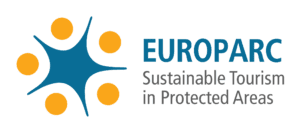
- April 9th -11th
- By: EUROPARC Federation
If you are interested in the social and cultural impacts of tourism, don’t forget to visit the XI Charter Network Meeting, hosted by the Tzoumerka, Acheloos Valley, Agrafa and Meteora National Park.
Find out the answers on questions emerging with visitor pressure increasing in many European Protected Areas:
- How to manage visitor flows?
- How to increase the social and economic benefits to local communities?
This time, Tzoumerka National Park is offering a special 2 day post-conference between the 12-14th April for those who would like to have the chance to visit Meteora.
The European Ranger Federation annual meeting (and Heritage Interpretation Workshop)
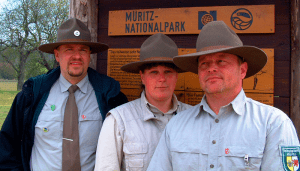
- April 10th – 13th
- by: The European Ranger Federation
From Rangers for Rangers. Before the Annual Meeting 2019 in Switzerland, there will be a two-day workshop focused on heritage interpretation. The workshop will be held in English and take place in Uster, near Zurich-Switzerland.
All Rangers are invited to stay also longer for the National Meeting with Fieldtrips and guided Ranger tours in English and German. Program includes Campfires, music and much more, in Ranger style!
International meeting on mountain-oriented education in the Alps
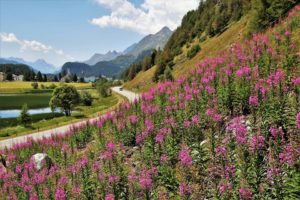
pixabay
- May 14th -15th
- By: Alparc. OurAlps International Network of mountain-oriented education in the Alps
Come discover the OurAlps international network and meet its stakeholders in Morbegno, Italy on the 14th and 15th of May 2019. Take this opportunity to help with development of their network. You’ll also learn about the Alpine School Model.
Agenda:
- conference
- workshops
- a field visit
Interpret Europe Conference 2019: Engaging with diversity
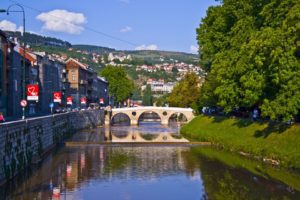
pixabay
- May 31st – June 3rd
- By: Interpret Europe – European Association for Heritage Interpretation
This year, IE Conference brings you to Sarajevo – the place that celebrates diversity. Turkish mosques and orthodox churches, scents of countless booths, offering street food from various cultures, the busy hammering of craftsmen creating artwork in tiny workshops: all of this turn the old heart of the Bosnian capital into what has been called the ‘Jerusalem of Europe’. Delve deep into its diversity, discuss how diversity at natural and cultural heritage sites can be interpreted and share your experiences. Hashtag for the event: #iecon19
EUROPARC Conference 2019, Latvia
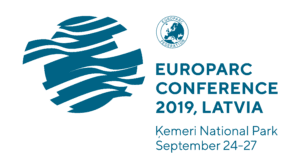
- September 24th – 27th
- By: EUROPARC Federation
The EUROPARC Conference 2019 is the key event of the year for those working in Europe’s Protected Areas. In 2019, EUROPARC Conference will take place from September 24th to 27th in Kemeri National Park, Latvia with the theme “Nature on your Mind: Understanding our Values”. Soon more information will be available.
2 dates to CELEBRATE!
The European Day of Parks
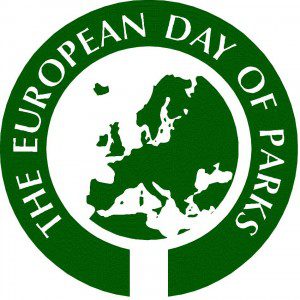
- May 24th
- By: EUROPARC Federation
The European Day of Parks is a commemorative day for Protected Areas across Europe that was launched in 1999 by the EUROPARC Federation to celebrate Protected Areas throughout Europe. It celebrates the creation of the 1st National Parks in Europe – a set of nine parks created in Sweden in 1909. This year, we will celebrate our “Natural Treasures”. Call your community and organise events to celebrate the role of your park in protecting our treasures. Then don’t forget to register your events here!
EU Green Week 2019

pixabay
- May 13th – 17th
- By: European Commision
The next edition of EU Green Week (13-17 May 2019) will show you the importance of environmental laws as well as their proper implementation.
The questions brought to spotlight will be:
- What does successful implementation look like?
- Why do “implementation gaps” exist?
- How can we move from knowing that stakeholders need to take ownership of these laws to actually making it happen?
- How can the EU facilitate the process, making sure that citizens’ voices are heard?
EU Green Week 2019 will include events across Europe, with the official opening event on May 13th in one of the EU Member States and a high-level summit in Brussels from May 15th -17th. The opening event will have a particular prominence, setting the tone for the Week’s debates. The closing of Green Week will take place at the end of the Brussels conference and will showcase the political conclusions from the Week.
Registration will open in March 2019. Hashtag for the event on Twitter: #EUGreenWeek